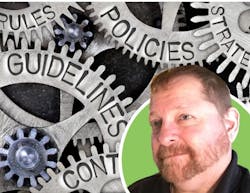Howes: The Three Ds and How They Can Help Make You A More Effective Leader
Recently, as I was developing our succession plan here at Atlantic Motorcar—let me pause. If you want something to make you humble, imagine planning out and thinking about what happens in the unfortunate event of your demise. Or as my CFO like to call it, in the event of the "Three Ds:" Disability, Death, and Disappearance.
Few things will give you greater clarity than spending a week or so kicking around how the world goes on without you. But you should do that; with two locations, we have something like 18 folks and their families that rely upon us, not to mention all our clients. They deserve to know that the show does go on.
Once we had the plan done—and I assure you it's not a simple task—we pulled in our attorney, accountant, CFO, and an outside coach to create the "Overview Team." I started thinking about what I wanted to share with my second in command, the next one at the helm.
These are ideas we kick around daily as we refine and develop our business, but they're also what I call “Golden Rules.” Having penned a short series of hard-earned truths and observations that we practice now, I wanted to be sure it didn't get lost. So, we started to weave them together as a story.
There's an entire paradigm based around what is called "corporate storytelling," and we used a simple version of that to help with "The Plan." Corporate storytelling, also called business storytelling, is a purposeful and systematic application of story techniques to help create desired business outcomes. People tend to remember stories much better than a series of rules as it illustrates the consequences. And each team member may tell the story differently (keeping the principles the same), which may resonate better.
I'll share more about the storytelling approach in a future column. But for now, here are the "Golden Rules" of our business.
AMC Leadership Thoughts
Solutions, Not Problems
I strive to empower my team to solve problems, not just report them.
I believe in this so strongly that even our problem reporting form has a spot labeled "Solution" right under the problem "Description" field. I know I've succeeded in my post as a leader when they're bringing me solutions, not just problems. This also helps the team "buy-in," empowering them and being part of the solution.
Ultimately in life, every job is about solving problems. It’s the complexity of those problems that determine the level of compensation. That explains why my neurosurgeon neighbor's house is a tad bigger than mine.
Reflections - Change the Ingredients
Change can be good; in fact, it almost always is. Realize that change can also be scary because we are creatures of habit. Habits generally keep us safe and comfortable, but they are also limiting.
I don't think I appreciated this until we replaced our general manager three years back. If you're trying to bake a different cookie because you are not happy with the one you have, you need to change the ingredients—not recycle them.
Culture Wins
You can't be everywhere at once. You cannot effectively micromanage your business and still have a life. At least not for long. The only way to do that in your absence is to create a culture that inculcates your values and goals.
There is a famous Peter Drucker quote that says, "culture eats strategy for breakfast." The culture of your company always determines success regardless of how effective your strategy may be. Culture is created by what you tolerate and the behaviors you encourage. Compliment people, and magnify their strengths, not their weaknesses.
The Only Constant Is Change
Change starts at the top. You need to be the cheerleader for your people, and then your people will cheer your organization.
Rules, policies, and procedures are necessary, but excessive rules mandating micro-behaviors are a sign of a broken culture. In a self-governing culture, the team members share a common vision and will internally self-regulate each other to honor that vision.
Leadership Is a Choice
I've been working with another shop owner recently, and frankly, it's been a struggle.
It's challenging because they know what they have to do, but they simply don't do it because it's too "painful," and people "may not like it" and "get mad at me." Like a sailing ship with no one at the helm, they lurch from crisis to crisis.
Responsibility
Employees are not responsible for implementing change; ultimately, you, as the leader, are. They're going to follow, but you have to lead.
There can only be one captain of the ship. If you don't lead, I've noted the strongest employee, and unfortunately, often the most negative, will.
Listening
As a leader, you should always be listening. When meeting with other team members, visibly write or note what you hear, repeat it back, and make them feel valued as contributors, not subjects. Your best "experts" are the team members doing the work. Ask them.
Fail Fast
When a failure occurs, learn from it, and then move on. Don't assign blame (unless absolutely necessary) or bring it up again and again.
Examine the problem, not the person
Keep a positive mindset and focus on team successes. 5:1 Rule—If you are quoting one failure, you must cite at least five successes.
No Excuses
Don't blame your team for your own weaknesses. That's worth repeating—don't blame your team for your own weakness.
Policies, Not Problems
When a problem occurs, decide if it could happen again or if it was a black swan event." If it was a black swan, learn the lesson, and let it go. Trust your team's character and culture. If it could happen again, make a policy or Standard Operating Procedure (SOP) to prevent it.
Get team buy-in on this (part of the solution, remember). Review it with all team members. Important policies, or SOPs, should be signed off on. Never make a policy or procedure to correct a character flaw with one employee, or to be punitive, fix, or fire.
Ask the question: Untrained or unwilling? Only one of these can be fixed. Remember the expression, "SOPs are written in blood." Something painful caused that to be created. Failure to follow it will allow it to happen again.
"Slow Day Action Plan" at Atlantic Motorcar Center
As a leader, understand that slow days will happen. It's how we respond to them that determines their value. A wise leader will use this moment to rally, encourage, motivate and train his troops. We call that "sharpening the saw" or "priming the pump."
Very Important: comebacks occur when technicians and the service team are not focused. Ironically, it's a fact that when shops have the freest time, the comeback rate goes up. The reason is loss of focus, eyes off the goal, and distractions. And a loss of morale.
Focus on doing a job, even a small job, will keep the team focused, intent, and building, or at the very least maintaining, morale. Excessive socializing during slow times does not prime the pump; it leads to distraction, loss of focus, and comebacks.
Let a team stand around, without a task, and invariably you'll get grumbling and a loss of leadership. The devil makes work for idle hands.
On the other hand, reward a highly functioning team well. Authentically praise in front of peers and the public. Be hearty in your approbation and lavish in your praise.
- Bruce
About the Author

Bruce Howes
Bruce J. Howes is the owner and founder of Atlantic Motorcar Services, a multi-location European specialty shop in Wiscasset, Maine. He is a 35-year veteran of shop ownership, with a fondness for process maps, literary quotes, and Ernest Hemingway books.
Bruce also works in emergency medicine as a second career and is a nationally registered Advanced Emergency Medical Technician (A-EMT). He serves as a board member at the Maine Maritime Museum and various local nonprofit organizations.
A strong advocate for continuing education, as well as peer-to-peer coaching, his shop recently established a dedicated in-house training center for technicians and shop owners, and hosts a new technician apprentice program. He can be reached at [email protected].
